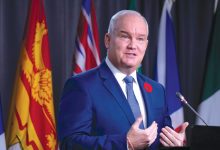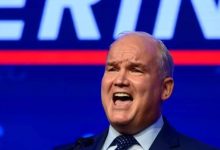Conservative Party plans a physically distant set of debates for mid-June
Debates between the candidates running to lead the Conservative Party of Canada will be held in Toronto later this month, the party announced today — the French debate on June 17 and the English debate on June 18.
Thanks to the pandemic, these debates won’t resemble the last set of Conservative leadership events in 2016-2017, when 14 candidates were crammed onto a single stage in front of a packed audience.
At the moment, the party’s plan is to respect public health directives on COVID-19 by keeping all four candidates — Peter MacKay, Erin O’Toole, Leslyn Lewis and Derek Sloan — in separate rooms at the debate venue in Toronto, and by keeping the audience virtual. The party will stream the debate live online.
“It’s almost like Hollywood Squares, where you’ve got the cameras on them and their monitors and they’re just talking to each other that way, ” said Fred Delorey, national campaign manager for O’Toole.
“This will definitely be different [from] past debates where there’s a natural energy in the room, with supporters that are coming in and people who are excited to be there. And those kind of magical moments when someone says something that becomes an applause line — there won’t be anything like that,” said Steve Outhouse, Lewis’s campaign manager.
A spokesperson for MacKay’s campaign said the candidate, considered the front runner in the campaign, expects to be the focus of most attacks during the debate.
“We will have to be ready to counteract some of the negative attacks that other candidates have been launching, but we know Mr. MacKay will be able to overcome that with his positive vision,” said Jordan Paquet.
A ‘blah’ debate?
Some party members worry the debate may be boring as a result.
“Much like the Conservative leadership race so far, the debates will likely be blah. However, you won’t hear the blah blah if they don’t remember to unmute themselves. Maybe in the case of certain controversial candidates, that will be considered a good night,” seasoned Conservative political strategist Tim Powers told CBC News.
“Given the entire race to date has been about preaching the same old bromides to hardcore members, this is a perfect form to do absolutely the same thing … the Conservative karaoke version of the Hallelujah Chorus.”
Other Conservatives argue that the smaller field of contenders this time will leave room for more pointed exchanges between the candidates — in particular between the two front runners, MacKay and O’Toole.
“Despite the two men being friends and having similar views, the narcissism of small differences in these contests often leads to sharp, adversarial exchanges,” said Kory Teneycke, former communications director for prime minister Stephen Harper.
“The lesser-known but fiesty O’Toole will be able to introduce himself to a broader public audience. And MacKay will be looking to put a series of minor campaign gaffes behind him and deliver a strong, substantive performance.”
MacKay, O’Toole and social conservatives
CBC poll analyst Eric Grenier said the English debate will be “extremely” important for MacKay and O’Toole — an opportunity for them to lock down second-choice support from the social conservative supporters of Lewis and Sloan.
“Both Peter MacKay and Erin O’Toole have said that they’re not social conservatives, but they do need the support of social conservative members in order to win,” Grenier said.
The Conservative leadership race will be decided by a ranked ballot. Party members will cast votes for the candidates in the order of their preference.
“In order to get those votes (second and third choices), they will need to at least show that they’re not opposed to social conservatives themselves, that they’re open to including them in the party even if they don’t agree with everything they stand for,” Grenier said.
Paquet said MacKay will present a “positive, big tent vision for the Conservative Party” he predicts will appeal to all party members. “We are proud to have a large campaign organization with supporters from all different backgrounds, including social conservatives.”
Time to test those French lessons
Others will also be watching to see how MacKay and O’Toole handle the French debate.
“Both MacKay and O’Toole have said they’re bilingual … but the debate will really be the first high-profile event where we will get to see what their French is like and also in an unscripted format. Because it is one thing to read a statement in French, it’s another to have a back and forth in a debate,” Grenier said.
O’Toole’e team said MacKay has to show his French is strong enough.
“He’s had 20 years to perfect his French. He’s been wanting this job since he was leader of the old party 17 years ago. So his French should be strong by now,” Delorey said.
Neither Lewis nor Sloan is fluently bilingual. Lewis’ camp says she has been preparing for the French debate on a daily basis.
“She obviously has said many times that she believes it’s important for the leader to be bilingual,” Outhouse said. “She will be participating in the French debate and showing that she is willing to work on that and to communicate the best she can.”
Participation in both debates is mandatory under party rules; any candidate who refuses to take part can be fined $50,000.
If pandemic directives are eased between now and June 17, the candidates may all appear on stage together for the debate — standing two metres apart to respect physical distancing rules — but there still would be no audience present.
The debates will be moderated by committee co-chairs Dan Nowlan and Lisa Raitt. Questions for the candidates are being solicited from Canadians and both events will set aside time for candidates to debate each other one-on-one.
CBC








Redes Sociais - Comentários